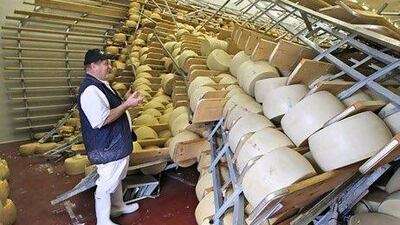Head to your favourite Italian restaurant tonight and the waiter might be a little less liberal dishing out the Parmesan cheese on your spaghetti.
Why? Because Parmesan supplies might begin running thin in the next few months after the earthquake that hit the Emilia-Romagna region in Italy this week damaged an estimated 400,000 wheels of ageing Parmesan. In Italy the cheese is officially known as Parmigiano-Reggiano.
Much like how champagne has to be produced in Champagne-Ardenne in northern France, the cheese is deemed real Parmesan only if it is produced in one of a number of provinces - Parma, Reggio Emilia, Modena and Mantua.
The overall effect of the earthquake on the Parmesan market is too early to tell, with reports from Italy reporting varying values for the lost cheese, which includes Grana Padano, Parmesan's cheaper provincial cousin.
But the 400,000 wheels could mean at least 10 per cent of production has been affected, the Parmigiano-Reggiano Cheese Consortiumsaid. The resultant shortage could push up the price of cheese already on the market.
The consortium makes €1.2 million in production revenues and €1.9 billion in consumer sales on an annual basis. The sales of Parmesan were on the rise in the past year, growing 20 per cent last month compared with a year earlier, according to official Parmesan statistics. But sales might now fail to reflect the increase in production. Parmesan is so precious in Italy that banks such as Credito Emiliano keep the cheese as collateral against loans to local producers.
"The earthquake was very strong and heavily damaged the structures of many warehouses as well as thousands of tonnes," said Stefano Berni, the head of the Grana Padano consortium.
In pictures of the aftermath of the quake, many of the wheels looked undamaged, but cheese experts say mold can set in quickly, leaving the stock worthless.

